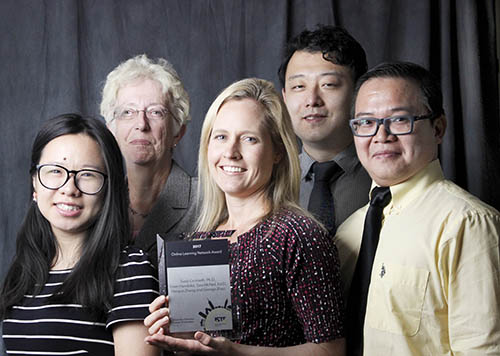UH College of Education Team Wins International Online Learning Award
In their instructional design course last semester, professors Susie Gronseth and Sara McNeil were planning as usual to cover the fundamentals, such as writing objectives and evaluating instruction.
“On paper it can be kind of dry,” said Gronseth, who teaches in the Learning, Design and Technology program at the University of Houston College of Education. “So, we thought, ‘Let’s make it exciting. Let’s give it some story element that might make it more memorable for the students.’”
They decided to turn the lesson into a video game. Students earned points while traveling virtually in space to five planets to find missing instructional design materials before an evil captain destroyed them. Students, via their avatars, had to “unlock” videos to learn critical information to complete their mission.

For their work, Gronseth, McNeil, staff member Erwin Handoko and doctoral students George Zhao and Haoyue Zhang earned the 2017 Online Learning Network Award from the International Society for Technology in Education. Their entry was called “3...2...1...Blast Off! Enhancing Student Engagement through Gamification of an Instructional Design Course.” They accepted the award in June at the ISTE annual conference.
“This project provided us with opportunities to inject new ideas and perspectives into a well-established course,” Gronseth said. “This creative approach made re-creating and teaching the course more enjoyable, and I think it helped to make the concepts and skills taught more memorable for the students.”
Helping with Memory
Waneta Hebert, a graduate student in the course and a high school English teacher, vouched for the effectiveness of the gamified approach on her blog.
“About two weeks into the class, I realized that I am 100% the target audience for gamification,” she wrote. “I’m a very competitive person, and this master’s program has made me realize how much of a perfectionist I am as well. When I saw my avatar in first place on the leaderboard, I grinned for days. I texted my mom, my friends, even my department head to tell them that I was in first place…
“I love it,” Hebert continued. “I laugh out loud at least once each time I complete a portion of the game. It gives us an easy entry point to difficult information and makes the class more entertaining, not to mention the fact that I can almost guarantee I will remember what I’m learning in this class better than any other, just from being able to associate what I learned in each module with each planet and part of the storyline.”
Hebert said she enjoyed the approach so much that she planned to gamify a lesson on Shakespeare for her own students.
Increasing Engagement
Trying new instructional strategies such as gamification can increase motivation among educators as well as their students, said McNeil, who serves as coordinator of the College’s Learning, Design and Technology program area. “It definitely increased my engagement with the course materials by adding the interactive story and sending the students off in space to find the missing instructional design materials.”
The project took McNeil, Gronseth and the doctoral students about two semesters to complete. They started by studying the research and theory behind gamification before crafting the storyline and interactive game elements, which included audio and video.
Students interested in the gamified lesson will get a chance to play in the spring 2018 instructional design course.
“This will be like version 2.0,” Gronseth said. “We took a lot of notes in the design process and collected status reports where the learners gave us feedback on the gamified experience.”
Zhao, who worked on the virtual design, now is researching the concept of applying a game-like points system to academic grading. Rather than losing points from a grade of 100, for instance, students would earn points for their work throughout a course. He plans to write his dissertation on the topic.
“I believe the system can also be applied to education,” said Zhao, a former English teacher with an M.Ed. in Curriculum & Instruction from UH. “It’s seen success in business and marketing and other fields.”
Learn More
The instructional design course is part of the College’s M.Ed. and Ph.D. degree programs in Curriculum & Instruction, with an emphasis in Learning, Design and Technology. The degree program caters to professionals in K-12 and higher education as well as those in business, medicine or other industries who want to improve their teaching and technological skills.
The master’s program also will be offered at UH Sugar Land for the first time in spring 2018. Please email professor Bulent Dogan at bdogan@uh.edu with questions about applying.
-By Ericka Mellon
-Photos by Jaime Questell